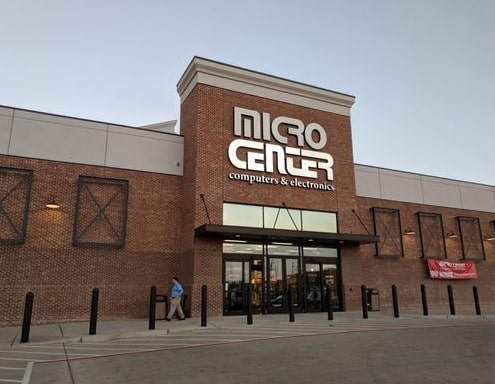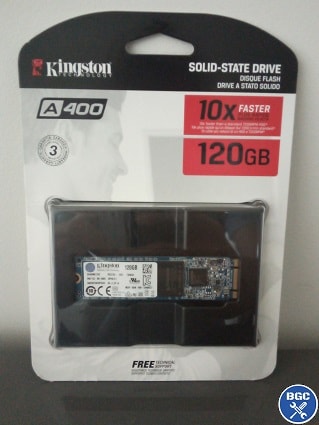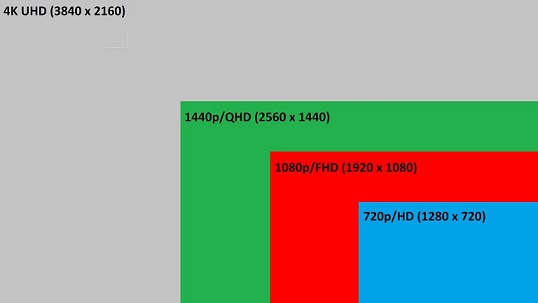Home > Gaming PC Builds > Saving Money
How to Save More Money When Building Your Own PC (Bonus Tips for Beginners)
Last Updated: January 9, 2022
Does building a computer save you money over buying one? If you are strategic about choosing the best value parts for your needs - almost always. This is fairly common knowledge within the PC gaming community, and one of the key reasons why you should build a PC.
But if you don't do a little research into how to choose the right parts for your custom computer, and tweak them for your particular needs, it's easy for newcomers to DIY to overspend on their parts-list in various ways, potentially limiting the savings you get when building a PC (and in the worst case, eliminating them to the point where you don't even save money over buying a prebuilt gaming PC.
The more aware you are of the hardware market, graphics technology, and PC gaming in general, the savvier a shopper you will be and you'll be able to save more money when building PCs, fully maximizing the returns you get from this great hobby. But just how much money can you save when building a PC? The larger your build budget, the more potential there is to save compared to buying a desktop. With decent component selections you could easily save a few hundred bucks when building a top of the range $3000 gaming PC for instance, whereas you might only be able to squeeze out $50 to $150 in savings when putting together a $500 budget build.
But beyond PC building 101 - strategically selecting the right combination of parts for your exact needs, combined with pinpointing where the value is in the hardware market at any given time as is the aim of our best custom gaming PC builds for the money series - there are a bunch of other money saving strategies to consider that can ease the strain on your wallet without lowering your overall experience all that much (if at all). If you're building on a budget, or just want to shave off some extra dollars on that parts-list you're currently weighing up, here are some handy tips to know if you're building that first or second gaming PC and you haven't (yet) cracked that code to a money tree.
1. Choose Components Based on the Games You Play
Not all games are created equal - not just in how good of a game they are, but in terms of their hardware requirements. Building a PC for League of Legends and building one for the latest graphically-demanding AAA blockbusters like Red Dead Redemption 2 - those are two completely different tasks. Game requirements can vary greatly, with less graphically-intensive titles only requiring a fairly cheap, basic modern PC for good performance, while more demanding games needing a fair bit more in terms of CPU and GPU firepower if you seek super smooth performance. When building a PC to save money, you want to tailor and tweak your hardware component selections for the task at hand, which means looking into the requirements of the games you will be playing.
Of course, the ideal thing to do when building a computer is to get a little bit more firepower than you need right now in order to be as "future proof" as possible (so you won't need to upgrade for a long time), but there are a lot of gamers out there who unknowingly spend way too much money on a gaming PC with so much power that they likely will never even fully utilize. To learn how demanding a certain game is and what sort of parts you'll need, see the game requirement guides in the main menu above that lists which exact specs you'll need in order to get great performance.
 Strategically choose parts for your favorite game/s to avoid overspending on power you don't need
Strategically choose parts for your favorite game/s to avoid overspending on power you don't need2. Stick to 1080p Gaming (Full HD)
When building a PC to save money, what's just as important as the actual games you'll be playing is the resolution of the monitor you will use (and its refresh rate, but we'll explain that next to avoid confusion). The difference in hardware requirements can vary greatly between different screen resolutions like 1080p, 1440p, and 4K (the 3 most popular PC gaming resolutions right now).
The higher the resolution of your monitor, the more pixels need to be rendered on screen, which is more taxing on your graphics card. This isn't immediately apparent to beginners who may be just getting into PC gaming, because when you go to check out a particular game's official system requirements (listed by the game developer on Steam etc), they only list a very generalized set of minimum and/or requirements that don't take into account the resolution you'll be playing at (nor the refresh rate). To save money on your PC build, we recommend the standard resolution of 1080p, which is still the most common used today (and likely will be for the foreseeable future).
Getting good performance at 1080p doesn't require spending much money on a graphics card (or other parts), unless it's an abnormally demanding game like Witcher 3 or Red Dead Redemption 2 (and you want to get 60FPS+ on high/ultra settings). Perhaps even more importantly, 1080p is still a high-enough pixel count for a high-quality experience that'll please most people.
Put another way, there's really no huge need for a higher resolution to fully enjoy your games. 1440p displays are becoming more popular these days, but they not only mean spending more on a 1440p monitor (which cost more than 1080p models), but also on a better graphics card to push that higher pixel count. You could argue that the higher quality, more-detailed graphics of 1440p gaming vs 1080p gaming isn't a big enough gap to justify the added cost (for most gamers). The difference between 1080p and 4K is more substantial, as 4K shows a massive amount of pixels compared to 1080p, but 4K monitors and 4k-capable graphics cards are expensive and so isn't relevant here in an article all about saving money.
The most common resolutions; don't get sucked in thinking you NEED higher than 1080p
As for those on a really tight budget, you may even want to consider dropping down below 1080p to 720p, which was previously the most common gaming resolution (a few years back). Definitely stick to 1080p if you can, but it's worth considering if you don't mind the lower image quality and are playing games that really aren't about the graphics (think CSGO, League of Legends, Minecraft, and even Fortnite). But 1080p is so accessible these days, and doesn't require much power from a PC, so you might as well stick to that unless you perhaps find an amazing deal on a 720p monitor and want to build the cheapest gaming PC humanly possible.
Whatever you do, to avoid spending more money on your computer than you need (a first world problem but it does happen unknowingly, even to those who think they're being cost-effective with their purchase), tweak your component selections for the resolution you'll be using. No point building a monster i7 9700K and 2080 Super build for over 1.5K if all you're doing is playing on a cheap 1080p 60Hz display where you could have done nicely on a budget build well under 1K. By the same token, it would be a letdown to build a super cheap gaming PC with mediocre components and pair it with a high-end 4K display, only to barely achieve a console-level 30FPS in your favorite game.
See Also: How to Choose the Best Gaming Monitor
3. Stick to 60Hz/75Hz (or 144Hz for eSports)
If you're unaware of PC gaming refresh rates like 60Hz, 75Hz, 144Hz, 240Hz, and the crazy new kid on the block 360Hz aimed at professional gamers, the one you choose also makes a difference in the parts you should choose for your new gaming PC build. 60Hz monitors have been the norm for an eternity, and allow you to "see" up to 60 FPS (Frames Per Second). 75Hz monitors (75FPS) are also quite common, and are essentially the same thing (as in, the same ballpark of image speed and hardware requirements).
Getting 60FPS and 75FPS to take full advantage of a 60Hz or 75Hz monitor doesn't require very beefy hardware (at least in most games), and that level of image "speed" is really all most people need to experience a super smooth, super fast gaming experience. Sure, if you can afford it, getting a higher refresh rate monitor like 144Hz is indeed worth it for FPS/shooter titles like CSGO, Overwatch, Tarkov, and so on (and you could argue Fortnite, PUBG, and Apex too). But the reality is, most gamers, who fall into the "casual" category (and aren't playing competitively or trying to) would actually have a hard time noticing the difference between "standard" screens like 60Hz and super-fast 144Hz+ displays if they took a blind test.
So to build the most cost-effective gaming computer, skip on the more expensive 144Hz displays (or faster ones like 240Hz which can be really expensive) and find a good-quality 1080p 60Hz/75Hz screen (ideally IPS for the best quality). That means you also won't need to spend as much on a graphics card (since 60FPS is way easier to achieve than 144FPS), as well as on your CPU - getting high frame rates of 144FPS or higher not only requires a beefy graphics card (unless it's an older game like CSGO or LoL which don't require much graphics power), but also depends on your CPU as well. And in more CPU-intensive games, getting 144FPS+ can actually be more dependent on your CPU (than your GPU). But getting 60FPS on a 1080p 60Hz monitor? Even the most basic of cheap CPUs can get the job done.
If all you play is fast-paced shooters, do consider 144Hz screens as you can find some inexpensive ones that won't cost much more than 60Hz displays, but give the expensive 240Hz screens a miss - the difference from 60Hz to 144Hz is noticeable for competitive players, but the 144Hz to 240Hz gap isn't as widely appreciated as all that noticeable (at least to most people). And getting 240FPS to take advantage of a 240Hz screen in the first place - that's no easy task (in most games) and will require a beefy CPU and GPU.
See Also: How to Choose CPU for Gaming
4. Play on Lower Settings
So now we've covered the games you're playing, and the resolution and refresh rate of your monitor - the most important factors that determine how powerful of a PC you need. But there's one more factor to consider; graphics settings. If you're new to PC, most PC games have in-game video settings you can change that affects the quality of the image and special effects. For example, you can alter the quality of the rendered shadows, fog, explosions, textures, and so on. Most games also have a few different preset options to make things easy, such as low, medium, high and ultra (the most common presets that games typically have).
So what's this got to do with saving money on a PC build? Some games perform quite a lot differently on different settings, and playing on low vs higher/maxed out settings can make quite a noticeable difference on performance, and therefore on what hardware you'll require to get a good frame rate. If you play a game on low or medium settings, you can get away with a cheaper PC compared to higher graphics settings, and in many games, especially titles that are more about the gameplay rather than immersive/realistic graphics, gaming on lower settings isn't going to make much (if any) difference to many players. For example, let's take one of the most popular games on the planet right now; Fortnite. The game is all about gameplay, and much less about its visuals (which are cartoon-like), so playing on lower settings is hardly going to make a difference to the experience (for most people anyway).
Plus, in some games it's actually more desirable to play on lower settings than higher ones. Take fast-paced shooters like CSGO and Overwatch for instance (and even PUBG, Fortnite, and Apex) - in these titles where every millisecond counts, getting the highest frame rate your system can is more desirable than getting higher graphics quality, in to avoid ever dropping under your refresh rate (ie 144FPS) during firefights and to also minimize input lag which is, believe it or not, related to your FPS (as NVIDIA has openly revealed to the eSports community recently with their release of NVIDIA Reflex).
So to keep costs low when building a gaming PC, when researching what parts you need for the games you play, don't forget to take into account the graphics settings you'll likely be playing at (and also perhaps look into whether higher settings in a particular title is worth it or not). Also keep in mind that not every game is the same in terms of how settings affect performance; one game may have a huge performance hit on higher presets, whilst another game may not perform much different at all on low vs higher settings.
See Also: PC Graphics Settings Explained (Is Ultra Worth It?)
5. Reuse Parts From a Previous PC
If you already have a desktop computer then you might be able to salvage some scraps and include some of its parts in your new PC build. Anything is fair game, assuming that it's going to be compatible with the new components you'll be buying, all the way from your previous graphics card (perhaps it's still decent and your new build is mostly about getting a new CPU and motherboard) down to little things like reusing the case fans or cable ties from within your previous case. We wrote a full guide on how to reuse parts for a PC build where you can learn handy tips on reusing any of your old parts.
Keeping your old accessories is another obvious way to save money on your new gaming computer build as many people will have an old keyboard or mouse lying around somewhere, and if not you're bound to know someone who does. Most gamers don't mind using basic no-frills accessories for gaming as only pro, aspiring pro, or cashed-up gamers have any real business using fancy, high-end devices with all the bells and whistles like RGB lighting, programmable buttons and macro keys, high-end tracking performance, etc. For the average casual gamer busting out a session of Fortnite or DOTA2, you're not going to see a difference, so don't rule out that dusty 10 dollar keyboard lying around the house unless you've dreams to become the next pro gaming Ninja (in which case you'll need a good gaming mouse for pinpoint accuracy, control and comfort).
6. Reuse Your Copy of Windows
Not only can you reuse hardware and accessories, but your operating system may also be something you can keep from your previous system which could be really helpful in saving money on your gaming PC build as buying a new copy of Windows will cost you around 100 bucks minimum. The bad news though is that not everyone is going to be able to reuse Windows and it'll depend on your edition/version that you have on your previous setup. Learn whether you can or can't reuse Windows for your build in our reusing PC parts guide.
7. Be Mindful of Deal Events (Black Friday etc)
To save the most money possible when building a gaming computer, keeping an eye out for deals is obviously one of the best avenues, so if you're near to an upcoming sales event like Black Friday or Amazon Prime Day you may want to be patient and wait it out.
Hardware deals aren't just found during the big events though, and you could see discounts at any time throughout the year if you're lucky. Handy places to check out are Reddit BuildAPCSales for the USA, BAPCSalesCanada, BAPCSalesAustralia, and BuildAPCSalesUK depending on your region. People on there sometimes list decent deals that they find out there online, and people also sometimes helpfully chime in on whether it's actually a good product or not, but obviously not all deals will be posted there.
Pro Tip: Use a site called CamelCamelCamel to check the price history of a product on Amazon to get a sense of whether it's a good time to buy a particular product, or whether it's currently overpriced (perhaps due to low availability).
8. Shop Around Online
A fair chunk of people buy their tech from Amazon these days due to often unbeatable pricing and reliable shipping, but always keep your options open and look around for each of your parts and accessories. You might just find a better price, or a deal, on a certain component elsewhere. Just also remember to factor in shipping costs if you do buy from multiple retailers. In the best gaming PC builds series I try to include alternative stores for the US, Canada, UK, and Australia whenever possible.
9. Consider Previous-Gen Parts
If you don't mind not having the latest and greatest graphics card or CPU, you can save a stack of cash by opting for a slightly older model, and if you choose wisely you won't be sacrificing on performance all that much. Despite the hype that inevitably surrounds new releases, CPUs and GPUs don't often leap that far forward when a new generation comes out, and the common misconception that the previous generation is automatically obsolete overnight and worth avoiding like the plaque once that new tech is out - it's mostly just smokes and mirrors created by clever marketing, over-emotional fanboys who think anything new is the greatest thing to grace the market, overly-enthusiastic sponsored "reviewers", and of course the general idea that newer must mean better (usually true, but not always).
Sure; not everyone thinks this way (that brand spankin' new tech is the ONLY thing you should ever buy), but I would say it's accurate to say that most less tech-savvy people (most general consumers, ie the masses) underestimate just how good older tech can still be. You don't always need the latest and greatest. Of course, don't buy an older part if it's truly objectively bad in the modern day and has considerably fallen behind performance-wise compared to newer offerings. And also don't buy too old so that you miss out on modern features and/or future upgrade-ability. Furthermore, be aware that older parts can sometimes be even MORE expensive than the current-gen due to low availability (low supply means higher prices). Just don't be afraid of considering older, supposedly "obsolete" hardware is all I'm saying. It could be where the current best value is for a particular component, and especially if you buy used, which leads to the next, and possibly most effective way to save money when building your next computer.
10. Consider Used Parts
Buying second hand hardware components (or accessories) is another obvious and easy way to save money when building a new PC, especially if you buy a used graphics card or another component that takes up a large chunk of your overall build budget (eg the CPU, or accessories like your monitor). This path isn't for everyone, as there are obviously risks to buying somebody else's hardware that could have led an interesting life (that may or may not be disclosed in the ad, and that also unfortunately may or may not be disclosed by a seller if you ask them). Plus, a used part may not be under warranty anymore, and even if it is, depending on your region and its laws, you might not even be able to claim it if something goes wrong with the product (but most of the time you should be safe).
But there certainly are parts you really want to avoid buying used, such as motherboards which have many different potential points of failure, and all sorts of things that could go wrong. Traditional hard drives (HDDs) are another thing you should probably just buy new, as they have finite lifespans due to the moving parts inside (SSDs are much better as there are no moving parts). Power supplies are also not worth the risk to buy used in my opinion, as a dodgy PSU that dies on you could spell the end of your system, possibly damaging other parts along with it.
11. Consider Barebone PC Kits
This isn't going to be applicable to most people, but another option in your arsenal to save money on a gaming PC build is to consider buying a barebone kit. Wait, what? Barebone kits may mean a combo of parts that are unassembled, but they also come in the form of semi-assembled desktops that come with a few parts already installed, with the buyer needing to add other parts of their choosing to finish off the system and make a working PC.
For example, you can sometimes come across a barebones PC that has the case, motherboard, fans, and maybe something else, all pre-installed and (almost) ready to go, and then you go in and add whatever CPU, RAM, storage, GPU, etc that you want. Barebone systems and kits can save you money, as well as time and effort, but they aren't all that common nowadays so it really depends on what's available at the time.
12. Check a Local Computer Store
Remember brick-and-mortar stores? You know, those physical locations in your town where you actually walk in to browse products on things called shelves? I kid you not, such ancient relics still exist in the modern digital era we're firmly entrenched in. Seriously though, while online shopping has now become the norm in society across most industries (not just tech) due to convenience and better prices (primarily due to the low overheads of online stores), you never know what you'll find at a local PC store.
If you have one nearby, it's worth checking out in case they have some deals, though you should check the website first. Nope, you can't escape digital life no matter what. For example, Micro Center in the US have long been known for their occasional CPU deals, and Fry's have had decent deals in the past on various parts too.
 Ain't no mirage or Photo-shopped fabrication: real-life stores still exist (somehow)
Ain't no mirage or Photo-shopped fabrication: real-life stores still exist (somehow)13. Forget Huge SSDs (& Just Get a Small One)
This one's probably one of the more obvious money saving tips, as it's fairly common knowledge that SSDs are more expensive than traditional hard drives, so if you're looking to cut costs on a PC build then just go with a regular HDD if you need a lot of storage space (for tons of games, videos, photos, etc) as you'll get much more storage for the price.
SSDs are quite a bit more affordable nowadays, so getting a small to medium sized one as your main system/boot drive to speed up Windows (and load speeds of a handful of programs and games you can fit on there) isn't going to hurt your wallet too much and is HUGELY worth it. Just don't go including a 1TB - 2TB SSD in your setup and wonder why you haven't much left for your other more important parts (like the CPU and GPU).
See Also: The SSD Buyer's Guide for Gamers
 Large SSDs aren't cheap, so if on a budget buy a small SSD for Windows and a large HDD for games
Large SSDs aren't cheap, so if on a budget buy a small SSD for Windows and a large HDD for games14. Pass on the Ace Aesthetics (RGB)
Contrary to popular belief, RGB does not increase your FPS. Sad, I know. PCMR memes aside, if your aim is to save money on your PC build, the primary focus should be function over form. Strategically choose parts that perform the best for the price - not that look the best. Passing on that awesome case with the fancy see-through side panels and super-cool RGB lighting will free up your budget for more important matters like your CPU, GPU and RAM.
It should also go without saying that you should skip on other cool features like custom PC water cooling (even closed-loop ones as air coolers are better value) and RGB peripherals if you want to cut costs as much as possible. To be fair though, even a cheap PC build can look great from the outside as there are plenty of very affordable yet good-looking gaming computer cases out there. Just don't waste 120 bucks on a fancy case when you could get something just as practical for half the price, leaving 60 extra bucks to put towards something more important like your GPU.
 If you care about gaming, a plain Jane build that performs nicely is always better than a fancy RGB one with low FPS
If you care about gaming, a plain Jane build that performs nicely is always better than a fancy RGB one with low FPS15. Consider Linux (Instead of Windows)
Not something I can recommend to beginner builders or those who aren't too tech-savvy, of I'm being totally honest not something I can recommend to anyone really (unless they have a good reason to), using a Linux operating system such as Ubuntu (there are many different Linux distributions) is an option, and, it's 100% Free. Windows is going to be the simpler way, as Linux is more technical and you'll be more on your own, but it's there as an option and there are certain benefits over Windows. But for most people, Windows has much better and far wider support for modern games.
Related: What to Do AFTER Building a PC (OS & Bios Setup)
16. Skip the Fancy Motherboard
Last but not least, based on my extensive experience building computers and helping others in the field, I'd say the most waste in terms of budget spent within people's builds would have to be on the motherboard. As explained in the guide on choosing a motherboard, most standard gaming or work PCs just don't need all that many features, and chances are good that your build really only needs a relatively basic mid-range motherboard at best, with a cheaper budget board typically being absolutely fine as well.
Of course it depends on your exact feature requirements, as well as future upgrade path (and how many options you want to keep open for the future). But in general it's safe to say there's no need to fork out hundreds on a new motherboard unless you have a good reason (eg overclocking a high-end CPU, where the motherboard does become a whole lot more important). That wraps up my best tips on how to save more money when building a new PC. Hope it helped and I wish you luck!
Trusted VPN
VPN software can be important in this day and age, especially if you do lots of online banking and/or use public WiFi whilst travelling. Having a VPN adds an extra layer of security to your PC or laptop when online to help protect your data, passwords, financials, etc from hackers or malicious programs. It can also let you access region-locked content (eg US Netflix from overseas). For gamers their can be even more benefits to using a VPN.
Because they're so popular these days, there are countless VPN providers, and it can be confusing to pick one. If you want my 2 cents, after a lot of research I decided on NordVPN 'cause it's one of the fastest, most reliable VPNs for both gaming and general use, with a lot of credible reviews out there backing that up. They also quite often run very solid deals.
Popular Articles (see all)
Search the Site
About the Author (2025 Update)
I'm an indie game developer currently very deep in development on my first public release, a highly-immersive VR spy shooter set in a realistic near-future releasing on Steam when it's ready. The game is partly inspired by some of my favorites of all time including Perfect Dark, MGS1 and 2, HL2, Splinter Cell, KOTOR, and Deus Ex (also movies like SW1-6, The Matrix, Bladerunner, and 5th Element).
Researching, writing, and periodically updating this site helps a little with self-funding the game as I earn a few dollars here and there from Amazon's affiliate program (if you click an Amazon link on this site and buy something, I get a tiny cut of the total sale, at no extra cost to you).
Hope the site helps save you money or frustration when building a PC, and if you want to support the countless hours gone into creating and fine-tuning the many guides and tutorials on the site, besides using my Amazon links if purchasing something, sharing an article on socials or Reddit does help and is much appreciated.


